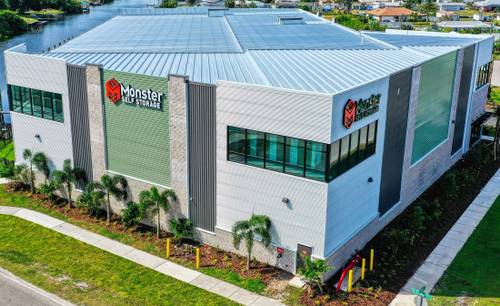In this episode of 5 Questions With, Hunter Molnar of Storage Exchange shares his insights on today’s self-storage investment landscape. Drawing from his background as an owner/operator, Hunter discusses how that experience informs his underwriting approach and broker opinions of value. He also dives into current buyer and seller expectations, key return metrics, and the growing trend of off-market deals. Whether you’re active in acquisitions or simply watching the market, this conversation offers practical takeaways for navigating today’s self-storage environment. Want to be featured in a future episode? Email…
Category: Featured Home Slider
Recent Self-Storage Transactions: 06.17.2025 – 06.23.2025
Recent self-storage transactions highlight a clear investor focus on operational performance and long-term market fundamentals. Capital is targeting a mix of Class A and B assets across diverse geographies, with a strong interest in high-occupancy properties, remote-managed facilities, and locations near residential and commercial growth corridors. Buyers continue to favor income stability and scale, particularly in Texas, the Southeast, and seasonal or recreational markets. Portfolio: Roll Up Self Storage (Class B Self-Storage Portfolio) Locations: Asheville and Weaverville, NC Address1: 15 Fallen Spruce Dr, Asheville, NC Address2: 1191 New…
Featured Broker: John C. Lindsey
John C. Lindsey isn’t just in the self-storage business — he’s redefining it. A dynamic force in the industry since 2008, John brings a rare blend of brokerage precision, development expertise, and global strategy to every deal. With a business degree focused on commercial real estate from the College of Charleston, he launched into self-storage straight out of school — and never looked back. Today, John is one of the most recognized names in self-storage brokerage. He’s led landmark transactions, advised on high-stakes storage projects around the world, and helped…
A New Self-Storage Facility Planned at Alhambra Boulevard, East Sacramento, CA
Project plans have been filed for a six-story self-storage complex at 1125 Alhambra Boulevard in East Sacramento. The development would replace a small retail center with the imposing facility within view of the Capital City Freeway. Texas Investment Company LLC is the project sponsor. The 74-foot-tall structure is expected to create 1,591 storage units across roughly 211,200 square feet and 5,000 square feet of commercial retail space. Four retail shops will be added along Alhambra Boulevard. Parking will be included for five bicycles, with space for two loading spaces. Sullivan…
Spartan Adds a New Self-Storage Facility to PNW Portfolio in Lake Stevens, WA
Spartan Investment Group, a Colorado-based privately held real estate investment firm specializing in the self-storage industry, has acquired a new self-storage facility in Lake Stevens, Washington. With 403 units totaling 31,035 net rentable square feet, this acquisition marks the tenth Pacific Northwest property added to their portfolio. Located at 8911 Vernon Rd., the Lake Stevens facility features 161 units of climate-controlled storage and 242 units of non-climate-controlled storage. Constructed in 1999, Spartan will invest $225,000 in upgrades and expanded amenities to improve curb appeal and modernize security. “As we continue…
6Storage and Calcumate Partner to Enhance Online Rentals for Self-Storage Operators in 25+ Countries
Key messages: 6Storage and Calcumate have concluded a partnership agreement which sees Calcumate deeply integrated into 6Storage, including its brand-new platform, 6Storage 3.0 Orders for the integration are being taken from today, and the integration of Calcumate into 6Storage will be completed in the coming weeks 6Storage, a global self-storage management software provider trusted by operators in over 25 countries, and Calcumate, the world’s leading 3D storage calculator for self-storage and moving providers, today announced a new integration partnership. The collaboration will enable 6Storage users to display Calcumate in an…
Talonvest Secures $17.8 Million in Financing for a Four-Property Self-Storage Portfolio Across Southern California and Arizona
Talonvest Capital, Inc., a boutique commercial real estate mortgage brokerage firm, is pleased to announce the successful closing of a $17,800,000 refinance loan on behalf of Tierra Corporation for a four-property self-storage portfolio located across high-demand markets in Southern California and Arizona. The portfolio includes properties in Riverside, Redlands, and Indio, California, as well as Yuma, Arizona. In total, the facilities span 377,939 net rentable square feet and comprise 2,252 non-climate-controlled drive-up units, 25 climate-controlled units, 4 manager units, and 198 RV parking spaces. The non-recourse, CMBS execution loan was…
Joseph’s Catering Property Will be Replaced into Self-Storage Facility in Horsham, PA
A new building is coming to the former Joseph’s Catering property, where a self-storage facility is replacing the five-decade catering business, writes Dino Ciliberti for the Patch. Joseph’s Catering closed for good after 50 years in May 2023, when the Messina family decided it was time to say goodbye. The new three-story facility will be a 120,000-square-foot building on a 5.68-acre site next to Hatboro-Horsham High School. It is intended for businesses prohibited from storing equipment and related items on their own properties, allowing them to use the space for…
Monster Self Storage Opens New Storage Facility on McCulloch Road in Orlando, FL
Monster Self Storage and Adams Property Group are proud to announce the opening of their newest facility, conveniently located at 4989 N Tanner Rd in Orlando, FL, just minutes from the University of Central Florida. The McCulloch Road location officially opened its doors in June, offering residents and students flexible, secure storage solutions. This state-of-the-art facility offers both climate-controlled and drive-up storage options, catering to a wide range of storage needs. The site also supports Amazon package drop-off and delivery services in coordination with the Amazon Hub Center, providing added…
5 Questions With Peter Smyth – White Label Storage
In this episode, we chat with Peter Smyth, CEO of White Label Storage, to unpack key questions around revenue management in self-storage. From avoiding common pricing mistakes to boosting ROI without raising rent, Peter shares practical strategies operators can apply right now. This short interview offers valuable insights for self-storage owners, developers, and investors looking to improve revenue strategies. Want to be featured in a future episode? Email us at info@listselfstorage.com About White Label Storage White Label Storage is a performance-focused self-storage management provider. With over 150 facilities across 35 states,…












